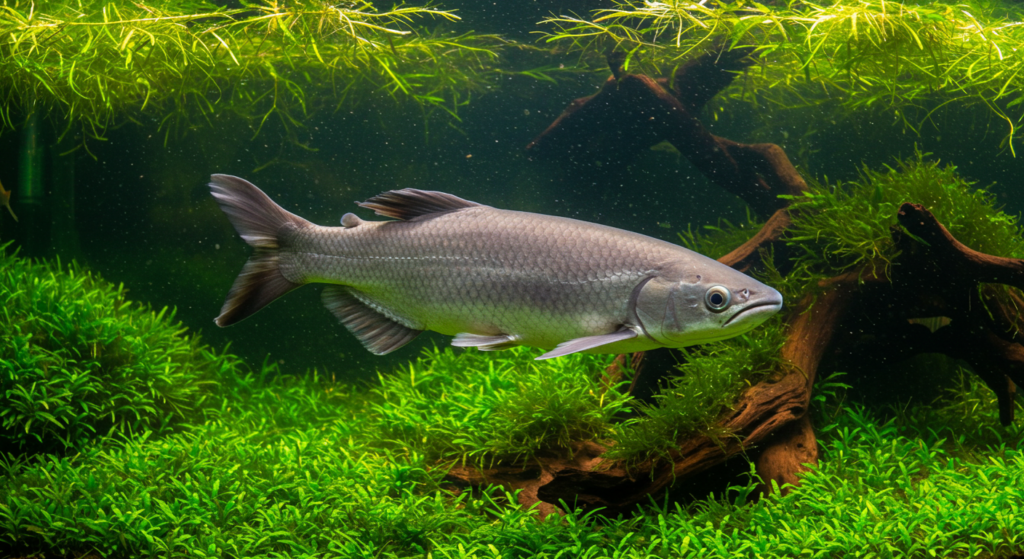Table of Contents
- Introduction
- Bala Shark Overview
- Appearance and Size
- Tank Requirements
- Water Parameters
- Diet and Feeding
- Tank Mates
- Behavior and Temperament
- Breeding Bala Sharks
- Common Health Issues
- Conclusion
- FAQs
Introduction
The Bala Shark (Balantiocheilos melanopterus), also known as the Silver Shark or Tricolor Shark, is a popular freshwater fish among aquarium enthusiasts. Despite its name, it is not a true shark but gets its moniker from its sleek, torpedo-shaped body and prominent dorsal fin. Known for its peaceful nature and striking appearance, the Bala Shark is a great addition to large community tanks.
This guide covers everything you need to know about Bala Shark care, including tank setup, diet, compatible tank mates, and breeding tips.

Bala Shark Overview
- Scientific Name: Balantiocheilos melanopterus
- Common Names: Bala Shark, Silver Shark, Tricolor Shark
- Origin: Southeast Asia (Thailand, Borneo, Sumatra)
- Size: Up to 14 inches (35 cm) in captivity
- Lifespan: 8–10 years with proper care
- Temperament: Peaceful, active, schooling fish
Appearance and Size
The Bala Shark has a silver body with black edges on its fins, giving it a striking contrast. Its streamlined shape allows it to swim swiftly, mimicking the movement of actual sharks.
- Juveniles: Typically 3–4 inches when sold in stores.
- Adults: Can grow up to 14 inches in large aquariums.
Tank Requirements
Due to their large size and active nature, Bala Sharks need spacious tanks.
- Minimum Tank Size: 125 gallons (for a small group)
- Tank Shape: Long and wide to allow swimming space
- Substrate: Fine gravel or sand
- Plants & Decorations: Open swimming areas with some hiding spots
Water Parameters
Maintaining stable water conditions is crucial for Bala Sharks.
- Temperature: 72–82°F (22–28°C)
- pH Level: 6.5–7.5
- Water Hardness: 5–12 dGH
- Filtration: Strong filtration with moderate water flow
Diet and Feeding
Bala Sharks are omnivorous and enjoy a varied diet.
- Staple Food: High-quality flakes or pellets
- Protein Sources: Bloodworms, brine shrimp, daphnia
- Vegetables: Blanched spinach, zucchini
- Feeding Frequency: 2–3 times daily in small portions
Tank Mates
Bala Sharks are peaceful but should be kept with similarly sized, non-aggressive fish.
Good Tank Mates:
- Giant Danios
- Rainbowfish
- Angelfish
- Corydoras Catfish
- Gouramis
Avoid:
- Small fish (neon tetras, guppies) – may be eaten
- Aggressive species (cichlids, bettas)
Behavior and Temperament
Bala Sharks are active swimmers and prefer to be in groups of 5 or more. They are generally peaceful but may become skittish if kept alone or in small numbers.
Breeding Bala Sharks
Breeding Bala Sharks in captivity is rare due to their large size and specific requirements.
- Breeding Tank: 150+ gallons
- Water Conditions: Slightly warmer (80°F) and soft water
- Spawning: Egg scatterers, no parental care
Common Health Issues
Bala Sharks are hardy but can suffer from:
- Ich (White Spot Disease) – Treat with increased temperature and medication.
- Fin Rot – Caused by poor water quality; improve tank hygiene.
- Stress-Related Illnesses – Ensure proper tank size and companions.
Conclusion
The Bala Shark is a stunning and active fish that thrives in large, well-maintained aquariums. While they require ample space and proper tank mates, their peaceful nature and striking appearance make them a favorite among aquarists. By following this care guide, you can ensure a healthy and vibrant life for your Bala Sharks.
FAQs
1. Can Bala Sharks live alone?
No, they are schooling fish and should be kept in groups of at least 5.
2. How fast do Bala Sharks grow?
They grow quickly, reaching 6–8 inches within a year under optimal conditions.
3. Are Bala Sharks aggressive?
No, they are peaceful but may accidentally harm small fish due to their size.
4. What is the lifespan of a Bala Shark?
With proper care, they can live 8–10 years.
5. Can Bala Sharks live with goldfish?
No, goldfish prefer cooler water, while Bala Sharks need tropical temperatures.
